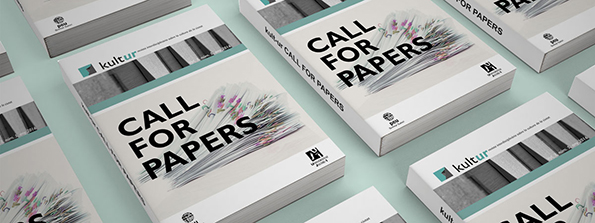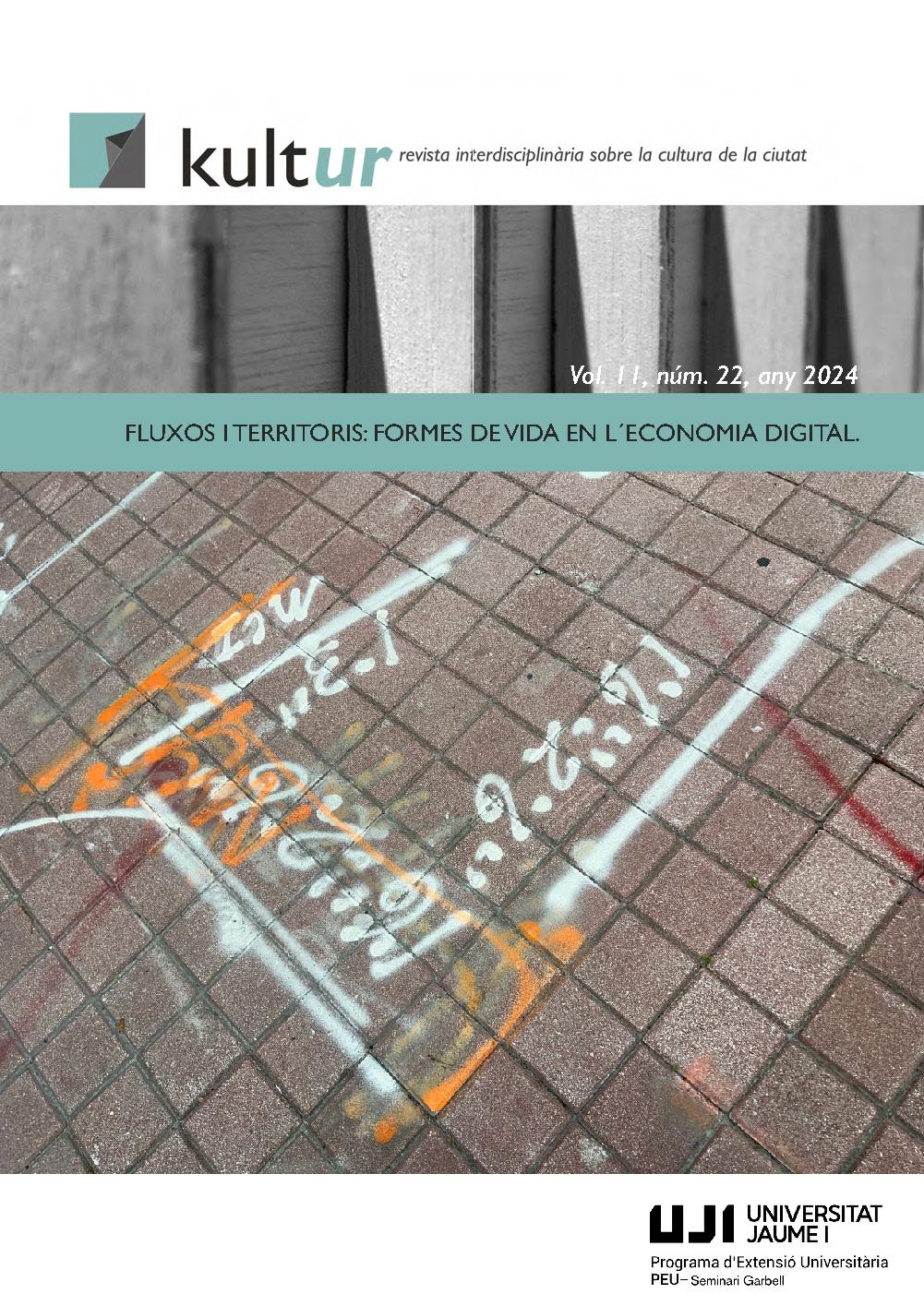Introduction to flows and territories: Ways of life in the digital economy
Landa (Pedro) Hernández Martínez
Higher Technical School of Architecture of Madrid, Technical University
of Madrid, Spain (doctoral candidate).
pedro.hernandez.martinez@alumnos.upm.es
landahernandezmartinez@gmail.com
The internet, conceived as a decentralised communication network, has grown and evolved into a vast global infrastructure: a web of undersea cables, antennas, satellites, fibre optics, users, mobile phones, data centres and mobile devices that interconnect the world across borders (Bratton, 2015) and seamlessly link up an immense amount of information flows. This infrastructure has enabled significant advances, from telecommunications to consumption, laying the foundations for our current economic model: platform capitalism. Inherent to platform capitalism is the dominance and hegemony of digital platforms, which act as intermediaries between users, consumers, suppliers, advertisers and even physical objects (Srnicek, 2018).
Digitalisation and the form of organising and exchange that platforms promote, by shaping economic processes, have introduced dynamics that directly alter the way we live. In other words, the development of the internet has had a profound impact on the physical, working and social environment.
The simple act of making an online purchase with just one click triggers a complex chain of interconnected processes: an algorithm processes and analyses multiple data in real time to optimise prices, routes and delivery times while humans and robots attend to the strict demands of uninterrupted, non-stop work (Crary, 2017). This entire digital consumer ecosystem is, in turn, underpinned by a sprawling logistics network that ranges from giant data centres to last-mile delivery drivers, often working in highly precarious conditions, who bring any product imaginable to our doorsteps.
In the meantime, cities are being transformed. New spaces spring up every day, such as delivery centres, ghost kitchens, dark stores or lockers. These ‘new’ architectures reshape the use and perception of urban space, displace traditional activities and generate new demands and needs for resources or mobility. Furthermore, internet-driven digitalisation has not only reconfigured the use of territory; it also affects the relationship between people and the objects that surround them. Each day we connect to dozens of technological interfaces (apps) that monetise every interaction and mediate many of our daily transport, shopping or work decisions.
In parallel, although this model has brought innovations that facilitate access to services of all kinds, from remote working to streaming entertainment, it has also increased inequalities. Bodies and territories become cogs in a wheel designed to maximise the continuous flow of goods and services in a form of exploitation that depends as much on mass personal data collection and intensive surveillance of our digital footprints (Zuboff, 2019) as on the extraction of resources such as rare earth minerals. Platform capitalism operates under an extractivist rationality that prioritises acceleration, operational efficiency, planned obsolescence, labour casualisation, and consumption at any cost. This translates into the manifest sacrifice of quality of life, job stability and the sustainability of the urban environment. Time, emotions and even private spaces, such as residential accommodation used for temporary rentals, have become economic assets and marketable goods.
The expansion of the internet and digitalisation raises urgent questions about how to regulate a system for which there is often no legislation. This technological efficiency, which prioritises profitability over well-being, must be balanced with equity, guaranteeing labour rights and protecting privacy and the use of public space. Reflection on this economic model could focus on how to redesign its dynamics to give greater weight to the common and collective, as well as to sustainability, without sacrificing the advantages of digitalisation. The construction of a more just future will depend on our ability to transform current logics and reclaim personal autonomy and social agency in a world increasingly mediated by platforms dominated, in the vast majority of cases, by private corporations.
Against this background, the Agora section of this issue of kult-ur invites us to think about the impact of these transformations and to understand, first of all, what they entail so we can then begin to imagine other possibilities for living and relating to each other, to technology and to the environment that go beyond exploitation or profitability.
Pau Olmo begins by introducing us to the physicality of the cloud, which, rather than an immaterial concept, is built on concrete physical places: data centres, huge spaces for storing data that consume enormous energy and water resources. Far from abstract concepts, these installations are specific urbanisms and respond to logics of economic and geopolitical power. Having explained this, Olmo then proposes alternative models, such as distributing data centres in communities, thus enabling the democratisation of their use and opening the debate to new models of data and energy governance so we can collectively imagine more equitable and sustainable futures.
In their article, Diego Morera and Rodrigo Delso explore how algorithms reconfigure urban time and space through the rationales of efficiency and acceleration mentioned above. Digital food delivery platforms act as urban infrastructures that use data and machine learning to optimise processes, from food selection and preparation to delivery. This creates tensions with traditional human and urban temporalities, transforming public space and social relations. Virtual restaurants and ghost kitchens illustrate how this algorithmic logic prioritises closely monitored time over human interactions, reducing public spaces to mere logistics hubs.
Azahara Cerezo, in turn, encourages us to rethink our relationships with technology, particularly with technological devices, which she understands as “blind objects”.
Unlike “black boxes”, which allude to the invisibility of internal processes, blind objects are broader structures that include environmental impacts, colonial dynamics and social inequalities. She approaches this concept, and the blindness that structures the manufacture and distribution of certain devices used in art exhibitions, such as virtual reality headsets, televisions or loudspeakers, through the art project Rutas raras. El trazado de la tecnología (Strange Routes: The Mapping of Technology), which she developed with Marc Padró (Colectivo Estampa), in an attempt to reveal the systems of global power and dependence present in everyday technologies and to reflect on their ethical, social and political implications.
Finally, Aissa Santiso offers alternatives for thinking about forms of digital relationships which go beyond the use of platforms or systems that depend on large technology companies. To do so, she explores various collaborative dynamics that have emerged from Latin American NFT communities, highlighting how blockchain technology has facilitated new forms of cooperation and governance. Resources such as royalties, splits, multi-signature wallets and DAOs have been key to implementing horizontal and transparent models for managing digital assets, offering other innovative forms of governance, decentralising decisions, promoting more inclusive practices and suggesting alternative models of economic and social interaction.
These articles are complemented by reviews of two books in the Biblo section: Atlas of AI. Power, politics and the planetary costs of artificial intelligence, by Kate Crawford, and Una rápida compañera. Arquitectura y trabajo en la Cuarta Era de la Máquina, by Víctor Muñoz Sanz, which expand on the topics addressed in this volume and analyse the material and social impact on living beings and the places we inhabit of, respectively, artificial intelligence and automation.
In this issue of kult-ur, we want to reflect on the profound impact of platform capitalism and digitalisation on our everyday lives, territory and social dynamics. In this approach, we explore the physicality of the cloud, the ethical challenges of everyday technologies, urban reconfiguration and decentralised governance alternatives. This issue seeks not only to understand the present, but to imagine a more equitable, sustainable and humane future.
Join us on this journey to imagine our relationships with technology, people and the environments in which we live.
References
Crary, Jonathan. 2015, 24/7. El capitalismo tardío y el fin del sueño. Ariel. Barcelona.
Srnicek, Nick. 2018. Capitalismo de plataformas. Caja Negra Editora. Buenos Aires.
Bratton, Benjamin H. 2015. The Stack. Massachusetts Institute of Technology. Cambridge.
Zuboff, Shoshana. 2019. The Age Of Surveillance Capitalism. Profile. London.



